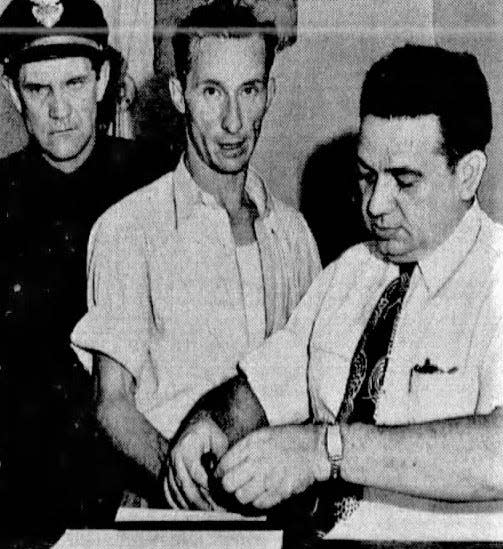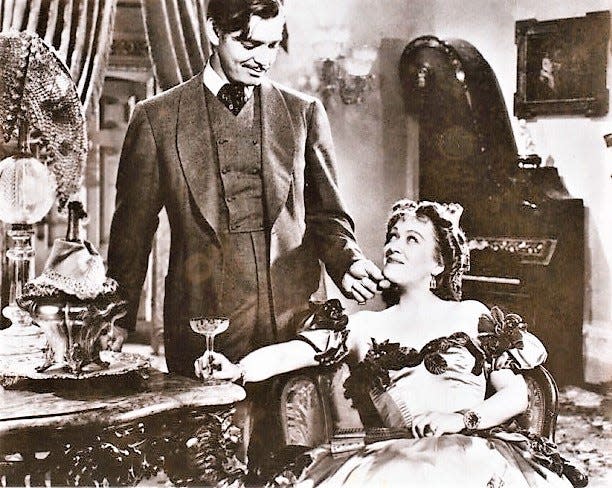Monday Mystery: An Augusta investigation followed death of 'Gone With the Wind' author

- Oops!Something went wrong.Please try again later.
The fatal injury of Georgia author Margaret Mitchell in 1949, stunned the state, saddened her fans and sent an Atlanta taxi driver to prison. But the big city tragedy also touched Augusta, prompting a newspaper investigation of elected officials, a proposed change in the city codes and scrutiny of local cabdrivers.
It was a curious time.
It began the evening of Aug. 11, 1949, when Mitchell, author of "Gone With The Wind," and her husband, John Marsh, were crossing Peachtree Street where she was struck by a vehicle driven by Hugh Dorsey Gravitt, an off-duty Atlanta cabdriver. She would die from her injuries.
Gravitt would later tell family members he was in a hurry because he was picking up a pharmacy prescription for a sick stepson. He would also point out that Mitchell and her husband were jaywalking and he did not see them in the middle of Peachtree Street because his vision was blocked by another vehicle.
From 2012: Church to get 'Gone With Wind' royalties
'It's very important to our state': Fight brews over Mitchell's papers

Police arrived at the scene and later testified they smelled alcohol on Gravitt's breath. He told the officers he had a beer with a co-worker several hours before and had then returned home and eaten dinner before heading off to get the youngster's prescription. Breathalyzers were not in use then. Others at the scene said Gravitt did not appear impaired.
Still, he was charged with drunken driving, speeding and driving on the wrong side of the road. He would later be convicted for involuntary manslaughter and go to prison for 10 months.
For the rest of his life, Gravitt would hear himself described as the "drunk," off-duty cabdriver who had run over the author of a book so popular it had sold more copies than any other except the Bible.
Over in Augusta, the story of Margaret Mitchell's accident involving a speeding cabbie prompted reporter Speir Collins to review Augusta traffic court records, looking for cases involving cabdrivers. When he did, something odd turned up.

Three local drivers had been released the day before, despite convictions on serious traffic offenses. They were paroled from the city stockade on the say-so of an Augusta city councilman. It looked like somebody had friends in high places.
The Chronicle wrote about all this the next day on its front page. It did not, however, report the name of the councilman or the names of the cabdrivers.
The following day, however, the newspaper did reveal the names after a delegation of newsmen sat down with the mayor, Dr. Will D. Jennings, to get an official explanation. The newspaper group included Louis Harris, the managing editor, back from World War II; Johnny Battle, the crusty old city editor, who had served in World War I; and Collins, the reporter who would later head to New York and a public relations career.
"Dr. Will" explained that City Councilman Frank Loyal had not ordered the Augusta cabbies released to gain political favors, but had been simply offering "mercy," allowing them to get back behind their wheels and earn a living.
He did this in his unnoticed, unannounced and heretofore unknown role as interim traffic court judge, a task he shouldered because Recorders Court Judge Berry Ellison had recently become ill. In fact, the newspaper reported, Loyal had released more than 30 sentenced to the stockade in less than two weeks.
Upon reflection and discussion with the mayor and three glowering newsmen, however, it was decided this arrangement comingled the city's legislative and judicial offices too much, and Clarence Powell, a well-known city lawyer, would step in to handle such traffic matters and would officially and publicly be sworn in to the job.
The mayor also announced proposed changes to city codes that would provide, among other things, stiffer traffic fines and tougher stockade restrictions.
Things appeared to have worked out for everyone except two of the Augusta cabbies, who lost their jobs when their companies discovered their traffic arrests.
Things also didn't work out for Hugh D. Gravitt in Atlanta. He went to prison, even spending some time on a chain gang. When he got out he went back to driving cabs, running an auto repair shop and managing three marriages.
In 1991, he told The Atlanta Constitution that the Mitchell tragedy had ruined his life.
After his death, his daughter wrote a book that reported his suspicion that Mitchell had been arguing with her husband and had run into his path to get away from her spouse.
His daughter suggested all this was covered up by the Atlanta newspaper, where Mitchell had worked, and by local authorities who treasured the memory of their Pulitzer Prize-winning novelist.
Bill Kirby has reported, photographed and commented on life in Augusta and Georgia for 45 years.
This article originally appeared on Augusta Chronicle: Mystery: Newspaper investigated councilman after Margaret Mitchell death

